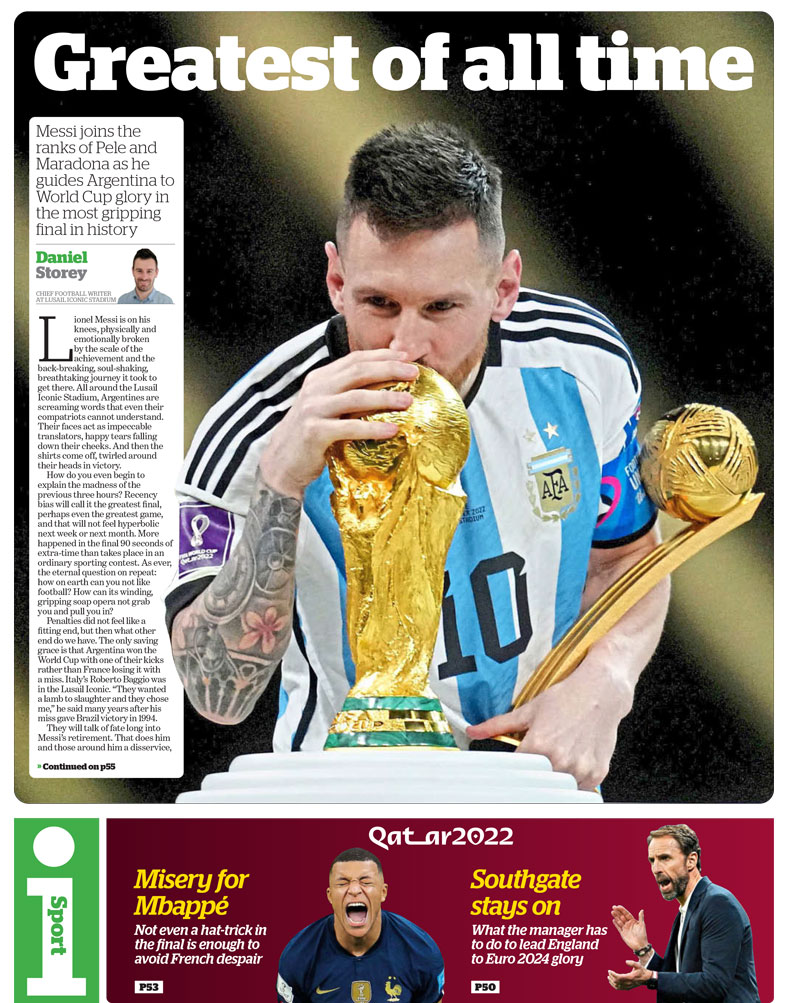The first ever winter World Cup was never going to be ordinary — both on and off the pitch, the tournament in Qatar has caused drama, controversy and protest. With a winner finally crowned in the Lusail Stadium on Sunday, here is how news brands covered the last four weeks
Controversy before the first kick
Disputes are no stranger to World Cups past, but Qatar’s staging of the tournament caused plenty of controversy before a whistle had even been blown. From underhanded dealings to secure the hosting rights to the deaths of migrant construction workers and the strict laws fans would have to abide by, plenty was reported, investigated and commented on in the run up to the games.
The Guardian’s post exposed the numbers outlaying the several issues that had emerged ahead of the games.
Meanwhile, The Times and The Telegraph covered how the England team responded to the Gulf state’s poor LGBT+ rights record, as well as how the sport’s governing body FIFA reacted to protests.
Welsh fans were also met with crackdowns. At Wales’s first match of the tournament against the US, rainbow bucket hats were confiscated as crowds entered the stadium, as reported by the Mirror and the Express.
Round up, round up
Although news brands’ scrunity continued, once the first game was underway, there was plenty of attention on the sporting action too. With several games happening a day, publishers helped readers digest all the most important information with daily round ups.
The Mirror and Metro’s Twitter round ups kept fans abreast of all the previous day’s highlights.
Meanwhile, podcasts’ longer format and ability to dive more deeply into the action were the perfect opportunity for news brands to explore all the previous night’s talking points, as well as what listeners should expect from the matches to come.
Both The Times’ twice-weekly ‘The Game’ and the Guardian’s ‘Football Weekly’ became daily podcasts for the duration of the World Cup, giving in-depth analysis and previews to all the action from Qatar.
On YouTube, The Independent’s chief football writer Miguel Delaney dissected all of the action from the quarter-finals by answering readers’ questions on social media.
The thinnest of margins
At the end of the day, it’s goals that mean prizes in World Cups, and there were plenty of brilliant, mesmerising and downright bizarre examples to keep replaying well after the match had ended.
The Telegraph showed a still of the contentious Japan goal against Spain on Instagram, which VAR had declared legal even though it appeared Kaoru Mitoma had taken the ball out of play before crossing to his teammate to score. The goal knocked Germany out of the competition in the group stages.
A tournament of firsts
The first World Cup in the Middle East was the first of many milestones reached in this year’s competition, which notably included the first African semi-finalists in an impressive Morocco.
The Times’ YouTube channel showed shots from Marrakesh, Rabat and around the world in the aftermath of Morocco’s victory over Portugal in the quarter-finals, while the Evening Standard showed how Moroccans were celebrating on the streets of London after beating Spain on penalties.
The tournament also saw the first ever all-women refereeing team officiating over a men’s World Cup match. The Guardian’s football writer Suzanne Wrack explained the importance of this historical moment.
England and Wales do nation proud
The UK had two home sides represented at a World Cup for the first time since 1998, with Wales appearing alongside England for the first time in 64 years. News brands got behind the national teams in their bids for World Cup glory, both impressing in their opening games to keep their dreams alive.
But with England and Wales drawn in the same group, their fate came down to a showdown against each other. The next day’s front pages from the English edition of the Daily Mirror and the Welsh edition of The Sun told a story of celebration and despair.


With England easing past Senegal in its second round tussle, there was much to celebrate as other rivals fell by the wayside. However, when reigning champion France was revealed to be England’s next opponent, the match was billed to be a titanic scrap for a coveted semi-final place.
News brands captured the tension as they analysed all of the potential flashpoints, including how defender Kyle Walker might match up against speedy striker Kylian Mbappe.
It was not to be. England clawed back a 1-0 deficit with a Harry Kane penalty, but when the captain was called once again to score from the spot after a second French goal, he missed. Despite not going as far through the competition as we had all hoped, publishers captured the moment of the team supporting each other and the nation’s pride in its efforts.
In spite of the disappointment, there is one thing coming home to England after all. Befriended by Kyle Walker and John Stones at the team’s Al-Wakrah training camp, Dave the cat will move to his new home in the UK soon.
Crunch time
In the end, it was the French who met the Argentines in the World Cup final, one of the tensest in living memory. With enduring legend Lionel Messi up against rising star Mbappe, penalties after two thrilling halves of extra time gave glory to Argentina.
The next day’s back pages were a celebration of Argentina’s win and Messi’s achievement, rounding off an unforgettable World Cup.











